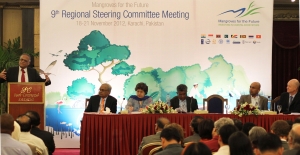Newsroom :: News :: 9th MFF Regional Steering Committee meeting emphasizes enhanced regional cooperation- Bangladesh inducted as the 9th MFF member country.
9th MFF Regional Steering Committee meeting emphasizes enhanced regional cooperation- Bangladesh inducted as the 9th MFF member country.
Location: Karachi, Pakistan. 18th Nov 2012
In his welcome remarks MFF Coordinator, Dr. Steen Christensen said, "All over the world, coastal ecosystems are faced with climate change challenges and this is particularly true for developing countries". Nearly half the global population lives in coastal areas and about 70% in east Asia depend on coastal resources for their livelihoods. "It will require collective efforts from all possible sectors to mitigate these effects and ensure protection, food security and adequate livelihood opportunities for vulnerable communities" he added.
In her inaugural speech Aban Marker Kabraji, IUCN Regional Director Asia briefed the session about escalating pressures from human development on coastal ecosystems. "Human activities are contributing to the vulnerability of coastal systems and communities to the effects of climate change" she said. "In countries like Thailand for example, more than 70% of the mangrove areas have been cleared for economic activities such as shrimp farming". Coastal Community Resilience will be a major focus of the MFF initiative in the coming years. Stressing the need for pro active engagement with the private sector, she added, "Private sector interests in costal zones are diverse and have a strong impact on coastal zones. Success in coastal management will depend largely on the motivation of the private sector to move towards sustainable business practices."
The 9th MFF Regional Steering Committee also welcomed Bangladesh as its newest member country. With the inclusion of Bangladesh, MFF now has nine full member countries. Welcoming Bangladesh as the newest MFF member, UNDP's Regional Environment Advisor Joseph D'Cruz said, "It has been good to see the continued growth of the MFF Partnership, both in terms of new members as well as in the breadth of issues and approaches being adopted. The inclusion of Bangladesh as the 9th MFF Member Country greatly strengthens our regional network. Bangladesh's widely-renown expertise on mangrove and coastal zone management will be a huge asset, and the effectiveness and dynamic of the Bangladesh NCB have been a great example for us all". Referring to MFF's increasing focus on resilience, he added " The insights that this approach brings will strengthen the impact and effectiveness of our work while helping to increase the capacities of the communities we work with."
Speaking on the importance of spreading awareness, Chief guest Javed Jabbar former Vice President IUCN and Regional Councillor said, "The task of educating and informing people about their importance of mangroves is immense. There is much to learn from the experiences of different countries in mangroves and costal conservation efforts. Coasts are "conflict zones" in terms of the state, communities and corporate interests and it requires dexterous management to find a balance between conflicting interests. This is a challenge our governments have to overcome". "Communities must be educated and in some cases persuaded to change their rapacious appetite for resource extraction."
Inspector General of Forests MOCC, Pakistan - Mr. Syed Mehmood Nasir - on behalf of Mehmood Alam - remarked, "In the wake of the Sandy storm and the Tsunami in Japan, it is heartening to see that the a regional initiative like MFF project is taking steps to respond to imminent dangers to vulnerable communities."
During the opening session a Call for Action was also launched. Sharing its details, Dr. Donald Macintosh, Senior Advisor for MFF said, "The Call for Action document emerged from the deliberations at the MFF regional colloquium held earlier this year in India succinctly summarizes the state of affairs of mangroves conservation in the region." The MFF Regional Colloquium was held from 30-31 August 2012 in Mamallapuram,Tamil Nadu, India.
Although India, Pakistan and few other countries have success stories to share, globally mangroves are still in decline by 1% per year. The 12 point Call for Action document underpins an urgent call for better and effective regional cooperation for mangroves protection and serves as a guide for better government decision making.
The RSC meetings discussed on the progress MFF member countries had made during the past year and presented their plans for the coming year. The Committee also discussed the ways economies are dependent on biodiversity and ecosystem services, while acknowledging that many far-sighted businesses are recognizing opportunities in the greening of investor, client and consumer preferences. Some businesses have made public commitments to ecological neutrality. Even relatively straight-forward ecological restoration as compensation for resource extraction or land use change can deliver biodiversity benefits.

